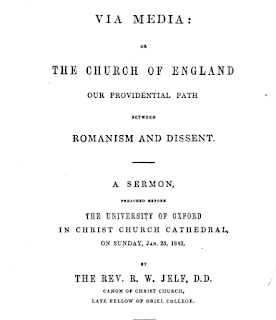"Reflecting the features of the primitive Church": An Old High Sermon during the Tract XC Controversy
Thus she inculcates the value and necessity of Good Works, whilst she disclaims for them the smallest particle of merit. She inculcates Justification by Faith alone (per fidem - sola fide) "only for the merit (propter meritum) of our Lord and Saviour Jesus Christ", but "good works (she teaches us) do spring out necessarily of a true and lively faith". She acknowledges "the services of Angels as ordained and constituted in a wonderful order", (Collect for St. Michael and all Angels) and commemorates the excellent graces of the Saints, and glorifies Christ in them, but she never invokes or worships either Saint or Angel. The spiritual presence of Christ's body and blood in the Eucharist, and their being verily and indeed taken and received by the faithful, is taught us from our earliest years; but the carnal and fleshly presence implied in the doctrine of Transubstantiation is rejected "as repugnant to the plain words of Scripture". The Holy Scriptures are daily read; but no fabulous legends. Instead of extempore prayer, we have a liturgy retaining what is primitive and good, but "paring off all excrescences, and adventitious corruptions of after times" [quoting Bishop Bull]. She enjoins daily prayer and thanks giving in the house of God, and the frequent "shewing the Lord's death" in the holy Eucharist; she rejects in severe language the Romish doctrine of "the sacrifices of Masses".
Such Old High confidence and joy in Anglicanism's native piety became, of course, a defining contrast with the Ritualist adoption of Tridentine piety and doctrine. There was no need for foolish looks across the Tiber, for "our Church contented herself with reflecting the features of the primitive Church".




Comments
Post a Comment